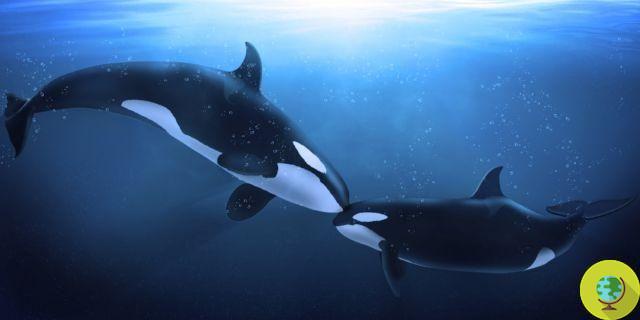Killer whales manage to live up to 90 years, far exceeding the reproductive age and menopause. A little mystery that scientists have been wondering for years, but now a new study reveals how this is possible.
Killer whales manage to live up to 90 years, far exceeding the reproductive age and menopause. A little mystery that scientists have been wondering for years, but now a new study reveals how this is possible.
The research published in PNAS is based on the analysis of data collected over thirty years in populations of killer whales living in the Pacific Northwest. Scientists have noted that young killer whales lucky enough to have grandmothers are more likely to survive than those without; moreover the risk of death of the killer whales increases drastically after that of the grandmother herself.
As we know, that of the killer whales is a matriarchal society and it is likely, according to experts, that so-called killer whales carry with them crucial knowledge about food resources that can affect the life or death of their relatives.
So in practice the grandmothers, or the killer whales that have passed the reproductive age, ensure better survival for their grandchildren. If the average life span of a male orca is around thirty years, the females are fertile up to about thirty-forty years, but they also live up to 90 years. They are one of four species in the world, along with Gray's human, narwhal, beluga and pilot whale, to go through menopause. And this is why their behavior has been studied for some time.

A systematic review
The new study published by PNAS is based on data collected on two populations (groups of several pods) of killer whales residing off the Canadian and US Pacific Northwest coasts. As stated in the research, the survival rate of 378 grandchildren of killer whales was analyzed, noting that the chances of survival were greater when a grandmother was present. By monitoring salmon abundance as well, the impact of a grandmother's death was greatest in times of scarcity.
"The death of a grandmother can have major repercussions for her family group, and this could prove to be an important consideration when evaluating the future of these populations," experts say.
Not only that, if the killer whales continued to reproduce they would not be able to offer the same support to the offspring, this means that the evolution of menopause has increased the grandmother's ability to help the grandchildren.
“The death of a matriarch can have major repercussions on her family group, and this is especially important when considering the future of killer whale populations. As salmon populations continue to decline, grannies become increasingly important to salmon populations, ”explains Dan Franks, a researcher at the University of York and co-author of the study.
Read also:
- Killer whales in Genoa, concern for the cub: it is not in good health, perhaps it is dying
- Endangered killer whales and salmon threatened by Trump-approved water plan. Scientific report hidden


























